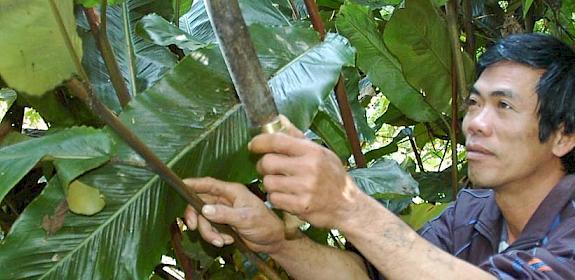International partnership calls for practical and scientifically-informed responses to zoonotic disease
Cambridge, UK, 16th October 2020—Fourteen international organisations are urging practitioners and decision-makers to develop practical and scientifically-informed responses to reduce risk from zoonotic diseases and build more collaborative approaches in human health and wildlife management.
The members of the Collaborative Partnership on Sustainable Wildlife Management (CPW) today published a joint statement setting out guiding principles aimed at reducing the risk of future pandemics originating from wild animals while strengthening the conservation of wildlife, and at the same time respecting livelihoods, food security and the culture of diverse groups of people.
The CPW is a voluntary partnership of 14 international organisations, including the Secretariats of the Convention on Biological Diversity (CBD), Convention on International Trade in Endangered Species of Wild Fauna and Flora (CITES), World Organisation for Animal Health (OIE), Food and Agriculture Organization (FAO), as well as NGOs such as TRAFFIC. The CPW was established with the aim of promoting the sustainable management of terrestrial vertebrate wildlife in all biomes and geographic areas, contributing to the conservation and sustainable use of biodiversity and to human food security and livelihoods.
The CPW principles stress the importance of maintaining and restoring healthy and resilient ecosystems to reduce risks of zoonotic spill-overs and future pandemics, while recognising the importance of the use of wildlife for many communities, including Indigenous Peoples and Local Communities (IPLCs), in policy responses. The CPW also warned that killing of wild animals suspected to transmit diseases will not address the causes of the emergence or spread of zoonotic diseases, and underlined the need for countries to regulate, manage and monitor harvesting, trade and use of wildlife to ensure it is safe, sustainable and legal.
TRAFFIC's Director of Policy, Sabri Zain noted that there have been calls to halt all commercial use of wildlife and the permanent closure of markets where wildlife is sold. "Such blanket injunctions that do not consider the socio-economic and cultural impact of these actions, the biological status of species, or the institutional challenges for implementing such measures, can be counter-productive."
Poorly considered or simplistic responses may aggravate the crisis and lead to significant land conversion, undermine food security and livelihoods for many communities, benefit criminal syndicates and damage those national economies that are already under pressure from global recession.
TRAFFIC's Director of Policy, Sabri Zain
Some uses of wildlife are indeed unsafe and pose risks to human health, including zoonoses. "Management and regulation of wildlife harvest, use and trade is therefore critical for conservation, animal and human health, and for combatting illegal, unhealthy or unsustainable practices," Zain stressed. "Such regulations require sound guidance, standards, risk assessment, risk management tools and effective enforcement and monitoring measures."
TRAFFIC is working with governments and international organisations across the globe in order to strengthen measures that ensure the legality, sustainability and traceability of wildlife specimens and products in international trade, and ensure wildlife trade monitoring mechanisms are in place to mitigate against the risk of disease emergence.
The CPW is also calling for strengthened multisectoral and multidisciplinary collaboration that will integrate health, food security and biodiversity approaches to reduce the risk of future pandemics. "Efforts by just one sector cannot prevent or eliminate future pandemics, " Zain said. "To contain these outbreaks effectively, a well-coordinated approach in addressing human, animal and environmental health is required."
"This One Health approach can only work with the collaboration of many professionals with a range of expertise who are active in different sectors, such as public health, animal health, plant health, wildlife management, economic development, wildlife use and trade, nature conservation, environmental protection and climate change," Zain concluded.
TRAFFIC is actively building partnerships with expertise across the health sectors and with government representatives to help formulate new policies and guidelines to reduce the risk of future pandemics. Those with whom we have been liaising include: the African Union Commission, the Pan African Veterinary Center of the African Union, and the FAO Regional Office for Africa, Germany's Federal Minister of the Environment, Germany's Permanent Representative to the United Nations, the African Development Bank, the Ministry of the Environment of Cote d'Ivoire, the UN Environment Programme, and the South African Minister for Environment, Forestry and Fisheries.
Notes:
The full CPW joint statement on 'The COVID-19 Challenge: Zoonotic Diseases and Wildlife'
The TRAFFIC COVID-19 Resource Centre
More information on the Collaborative Partnership on Sustainable Wildlife Management (CPW)




